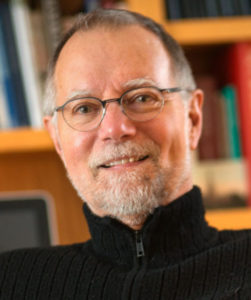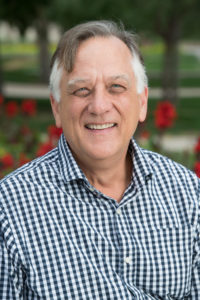Well-known economist Robert H. Frank, the Henrietta Johnson Louis Professor of Management at Cornell University, will join CSU’s own leading economist, Edward Barbier, for a pair of plenary sessions on campus as part of the 16th World Congress of Social Economics on June 11.

Frank, whose “Economic View” column has appeared monthly in The New York Times for more than a decade, will speak from 9:15 to 10:30 a.m. on “Social Contagion,” the title of his next book. Barbier’s talk, being held from 4:15 to 5:30 p.m. that same day, is titled, “Nature and Wealth: Overcoming Environmental Scarcity and Inequality.” Both talks are free and open to the public, and will be held in Clark A201.
The World Congress of Social Economics will be held on campus June 11-13. Steve Pressman, a visiting professor at CSU, serves as vice president of the Association for Social Economics, which is co-hosting the congress with the CSU Department of Economics.
About Robert Frank
In addition to his faculty position at Cornell’s Johnson Graduate School of Management, Robert H. Frank is a Distinguished Senior Fellow at Demos.
He received his B.S. in mathematics from Georgia Tech, and then taught math and science for two years as a Peace Corps volunteer in rural Nepal. He holds an M.A. in statistics and a Ph.D. in economics, both from the University of California at Berkeley.
16th World Congress of Social Economics
Both plenary sessions at CSU will be held June 11 in Clark A201, and are free and open to the public:
• Robert H. Frank, the Henrietta Johnson Louis Professor of Management at Cornell University
9:15 to 10:30 a.m.
“Social Contagion”
• Ed Barbier, professor in CSU’s Department of Economics and a Senior Scholar in the School of Global Environmental Sustainability
4:15 – 5:30 p.m.
“Nature and Wealth: Overcoming Environmental Scarcity and Inequality.”
His papers have appeared in the American Economic Review, Econometrica, Journal of Political Economy and other leading professional journals.
His books have been translated into 23 languages, including Choosing the Right Pond, Passions Within Reason, Microeconomics and Behavior, Principles of Economics (with Ben Bernanke), Luxury Fever, What Price the Moral High Ground?, Falling Behind, The Economic Naturalist, The Darwin Economy, and Success and Luck.
The Winner-Take-All Society, co-authored with Philip Cook, received a Critic’s Choice Award, was named a Notable Book of the Year by The New York Times, and was included in Business Week’s list of the 10 best books of 1995.

Frank is a co-recipient of the 2004 Leontief Prize for Advancing the Frontiers of Economic Thought. He was awarded the Johnson School’s Stephen Russell Distinguished teaching award in 2004, 2010 and 2012, and its Apple Distinguished Teaching Award in 2005.
About Edward Barbier
Edward Barbier is a professor in CSU’s Department of Economics and a Senior Scholar in the School of Global Environmental Sustainability. He previously held positions at the University of Wyoming, University of York and International Institute of Environment and Development.
Barbier’s main expertise is natural resource and development economics as well as the interface between economics and ecology. He has served as a consultant and policy analyst for a variety of national, international and non-governmental agencies, including many UN organizations, the OECD and the World Bank. Barbier is on the editorial boards of several leading economics and natural science journals, and he appears in the 4th edition of Who’s Who in Economics. In 2008, he was named by Cambridge University as one of the 50 most influential thinkers on sustainability in the world, and among his honors and awards, he has received the 1991 Mazzotti Prize (Italy) for contributions to economics and ecology.
Barbier has authored over 300 peer-reviewed journal articles and book chapters, written or edited 22 books, and published in popular journals and media. He is consistently ranked among the most highly cited environmental economists worldwide, and among the top 5 percent of economists globally by citations. Google Scholar lists him as currently having over 45,000 citations to his scholarly works, including nearly 17,000 since 2013. Professor Barbier was elected as a 2015 Fellow of the Association of Environmental and Resource Economists. Barbier’s books include Blueprint for a Green Economy (with David Pearce and Anil Markandya, 1989), Natural Resources and Economic Development (2005), A Global Green New Deal (2010), Scarcity and Frontiers: How Economies Have Developed Through Natural Resource Exploitation (2011), Capitalizing on Nature: Ecosystems as Natural Assets (2011), A New Blueprint for a Green Economy (with Anil Markandya, 2012), and Nature and Wealth: Overcoming Environmental Scarcities and Inequality (2015).
The Association for Social Economics
The Association for Social Economics was founded in 1941 to promote high-quality research in the broadly defined area of social economics. Social economics is the study of the ethical and social causes and consequences of economic behavior, institutions, organizations, theory, and policy. The fields of research promoted by ASE include the mutual relationships among ethics, social values, concepts of social justice, and the social dimensions of economic life. Social economics investigates the relationships between the economy and society. Social economists address such questions as: what economic conditions are requisite for a good society and how can they be achieved; how do social and moral values influence economic behavior; how does social interaction affect economic outcomes; what are the ethical implications of economic theory and policy; and how do different social institutions contribute to a sustainable, just, and efficient economy. The ASE welcomes academics and practitioners who regard human behavior to be the result of complex social interactions with ethical consequences.